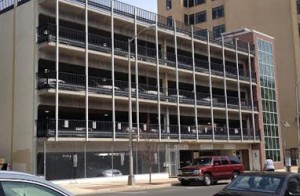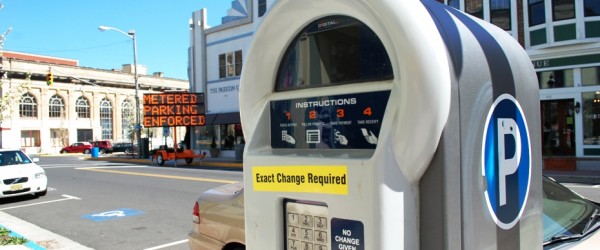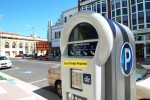NEW PARKING ORDINANCE BEFORE CITY COUNCIL WEDNESDAY
Changes include shift on parking meter rates and permit management
The Asbury Park City Council will vote to introduce an ordinance Wednesday during its 7 p.m Regular session meeting that manages its parking throughout the Central Business District Area of Cookman, Bangs, Lake, and Mattison Avenues and in the waterfront area.
The changes include shifting metered parking costs from a flat hourly rate to one adjusted for peak and non-peak hours and seasons, municipal spokesperson Hannah Walker said in a written news release. It also issues new rate options for resident and employee parking permit passes, and introduces discounted smart cards for meter use.
But residents are still questioning the details and what may be considered loop holes in the new guidelines.
“Are we prepared for the implementation of the parking permits,” asked Rob Weiner of Mattison Avenue. “Are the clerks who are going to handle this trained and prepared for this.”
Weiner also questioned whether public knows what is required at time of purchase, the acceptable methods of payment, where purchases can be made and how the new $75 per month residential parking program at the state-owned Bangs Avenue garage will affect existing clients.
“I’ve been parking there [Bangs Avenue garage] for six years,” he said “I went over there and they didn’t seem to know what was happening yet.”
This is just the first step toward parking changes aimed at managing the city’s parking situation, City Council and Parking Advisory Committee member Joe Woerner has said. In the future the city plans to hire either an outside consultant or create an in-house parking management position to advise the City on parking policy and management.
For now, there’s room in the ordinance for these measures to be altered and adjusted later on, said Parking Advisory Committee member Michael Sodano.
“This is just the next step in a multi-pronged process,” Sodano said. “It’s not set in stone. It’s just another step in the plan, and hopefully this gets us to bridge the gap while we continue to investigate and fine-tune. It’s a multi-layered answer to a multi-layered problem.
The Parking Advisory Committee has been working for the past year to vet the Desman Associates parking study released in March.
“Asbury Park has incredibly limited resources when it comes to parking,” Sodano said. “We’ve been trying to expand those resources, and now with the revamping of the ordinance we are putting that all together into a management plan for parking.”
St. James Place resident Wayne Connelly said the ordinance as it stands leaves room for what could be considered loopholes.
“What is your flexibility might be a loophole to me,” Connelly said. “It may mean an objectionable change to me.”
Connelly gave an example of the potential for residential permits to distributed as metered smartcards.
“I can tell you, going to a meter every time as a resident would just be unworkable,” Connelly said. “Why wouldn’t the ordinance say the resident permit must be of a type that does not require going to a meter? As a resident, we should not have to go to the meter every time we want to park.”
Woerner said that was not the intention from the Parking Advisory Committee but rather smartcards would be distributed for the employee permit parking program.
“This is a first step, or second step, or third in a process,” Woerner said. “No one is trying to do a gotcha – I hope you get that feeling from the parking committee. We are trying to include as many people as possible.”
City Manager Michael Capabianco said once the ordinance is adopted, it will fall to him as executive director to create standard operating procedures [SOP].
“I’ll have to promulgate the rules and regulations and the SOPs,” he said.
Capabianco said he is open to address what might be considered potential loopholes.
The new parking guidelines are based on a goal to create an 85% occupancy, Woerner has said. That means bringing that percentage up during off hours, using lower pricing to motivate visitors to visit the downtown area at low-volume times of the day and year, and encouraging other types of transportation including bikes, trains, cabs, Uber rides, carpooling and others.
Metered parking rates will shift from as low as fifty cents an hour to as high as $2 an hour, depending on the street, time of day, and part of the year, Walker said. The calendar is divided up between a peak season from May 15 to September 15, and a non-peak season from September 15 to May 15. Price per hour is calculated from 9 a.m. to 5 p.m. and from 5 p.m. to midnight.
Residential street parking permits are as follows:
If a resident has no access to off-street parking in the form of a garage or driveway, they are entitled to two street parking permits per home.
If a resident has off-street parking they are entitled to one street parking permit per home.
Employee parking has been added at the Transportation Center and Memorial Drive lot as well as blocks near the city’s downtown.
“This policy is not new but introduces a renewed focus on enforcement of the policy by the city,” Sodano said.
The proposed ordinance is the product of feedback from multiple sources, including professional parking consultants, resident feedback, business owners, employees, and the City Council and City Manager.
It’s targeted at residents, visitors, business owners, and employees within Asbury Park, Walker said. If adopted the new parking guidelines will take effect Feb. 1.
“We’ve weighed a variety of viewpoints and perspectives, and it’s been a very painstaking process,” Woerner said. “It’s impossible to provide enough spots for everyone and give everyone what they want. Our goal is to provide parking for residents and to have parking available for our visitors, business owners, and employees.”
————————————————————-
Follow the Asbury Park Sun on Facebook, Twitter and Instagram.
The Asbury Park Sun is affiliated with the triCityNews newspaper.






